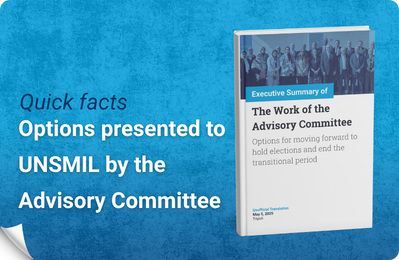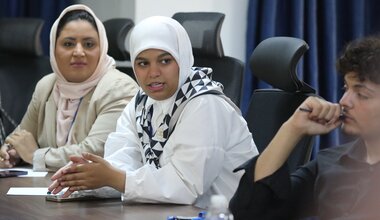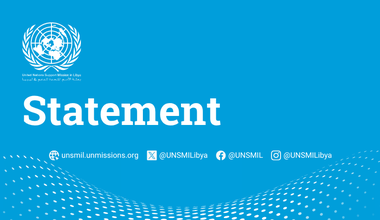Statement by the Co-Chairs of the International Follow-up Committee on Libya - 20 June 2025
Berlin, 20 June 2025
1. On June 20, 2025, the International Follow-up Committee on Libya, co-chaired by SRSG and Head of UNSMIL, Hanna Tetteh, and Ambassador Christian Buck, convened at Senior Official level in Berlin, in support of the implementation of a Libyan-led and Libyan-owned political process facilitated by the United Nations, leading to a political solution of the Libyan crisis.
2. The following countries and regional organizations participated in the meeting: Angola (current Chair of the African Union), Algeria, China, Egypt, France, Germany, Italy, Libya, Morocco, the Netherlands, Qatar, Russia, Saudi Arabia, Spain, Switzerland, Türkiye, the United Arab Emirates, the United Kingdom, the United States of America, the African Union, the European Union, the League of Arab States, and the United Nations.
3. In their first meeting since October 2021 in the IFCL plenary format, established by the two Berlin Conferences on Libya of January 2020 and June 2021, participants reaffirmed their commitment to the UN-facilitated political process in Libya and their respect for the Security Council resolutions.
4. They reaffirmed their full respect of and commitment to the sovereignty, independence, territorial integrity, and national unity of Libya, and reiterated their will to continue supporting Libya and its people. They underlined their commitment to refrain from interference in the internal affairs of Libya and urged all international actors to do the same.
5. Assessing the current situation in Libya, participants noted with regret that while the 2020 ceasefire agreement is holding, it is yet to be fully implemented. Initial progress towards a political solution of the Libyan crisis has stalled. This presents growing risks for the stability and unity of Libya due to the crisis of legitimacy of Libyan institutions, fragmented governance structures, and the rapidly deteriorating economic and financial situation.
6. Participants commended the efforts of Libyan actors towards national reconciliation, and recognized the constructive role of the African Union in this respect. UNSMIL looks forward to working in close coordination with member states on any supporting initiative, as well as with regional organizations.
7. Participants expressed grave concern at recent armed clashes in densely populated areas, particularly in Tripoli, that led to the loss of lives and damage to civilian infrastructure. They noted the failure to uphold international humanitarian and human rights law country-wide and emphasized the imperative for all parties in Libya to refrain from violent means to resolve conflict. They welcomed the establishment of the Truce Committee and the Security Arrangements Committee under the Presidency Council and expressed support to their work. They recalled the Security Council statement of 17 May calling for the accountability of those responsible for attacks against civilians.
8. Participants recognized the important work of the UNSMIL-facilitated Advisory Committee in outlining viable pathways to address critical contentious issues that are impeding progress in the political process. UNSMIL briefed participants on its engagement of the broader public alongside political and security actors in order to build consensus and broad-based support for a clear consensual roadmap towards elections and unified institutions based on an agreed legal framework within a clear timeframe and tangible milestones. Participants discussed the need for renewed international coordination in support of the UN-facilitated political process. They further called on all parties to refrain from taking unilateral actions that could further entrench divisions, and recalled that those obstructing the political process shall be held accountable, including under the relevant Security Council resolutions.
Way forward
9. Participants re-affirmed their commitment to hold regular meetings in IFCL plenary format to channel international support to the UN-facilitated political process, and noted that Libya was added to the format in 2021. Participants agreed to strive for a more active and coordinated role of the four working groups (political, economic, security, human rights and IHL) and to discuss the way forward.
 United Nations Peacekeeping
United Nations Peacekeeping UN
UN







